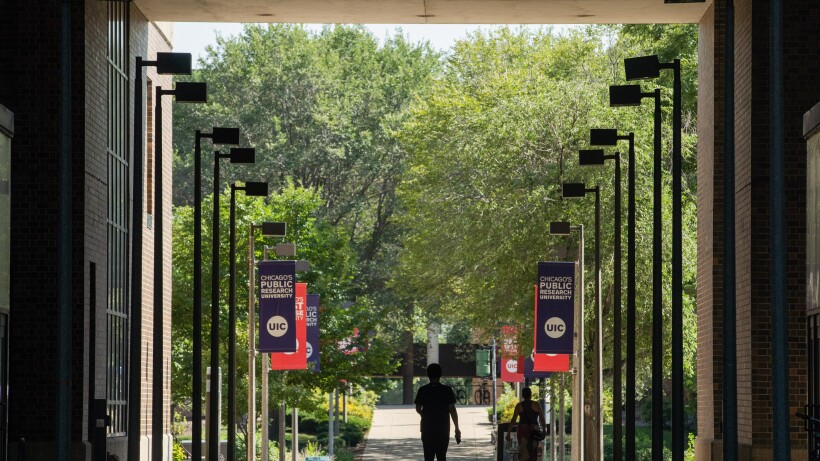Politics
University of Illinois Chicago Ends Race and Gender Criteria in Aid

The University of Illinois Chicago (UIC) has decided to remove considerations of race, color, national origin, sex, and gender from its financial aid and faculty hiring processes. This change aligns with a new policy from the University of Illinois System and purportedly adheres to “current legal standards,” according to a statement from university officials.
This policy shift occurs despite an August court ruling that directed the Trump administration to abandon guidance that would limit diversity, equity, and inclusion initiatives in higher education under the threat of federal funding cuts. In a recent move, the White House proposed an agreement that would grant universities greater access to funding, contingent upon their compliance with several political priorities, including the prohibition of race and gender considerations in admissions and hiring. To date, six institutions have rejected this compact.
Nicole Nguyen, a faculty member at UIC and a leader within the university’s faculty union, expressed her concerns about the implications of the new policy. “There’s no new law or new executive order constricting what the university system is allowed to do, so it does feel like a voluntary capitulation,” she stated. Nguyen emphasized that many students face disadvantages based on their backgrounds, and scholarships aimed at addressing racial and gender inequities are essential for creating a more level playing field.
With over 35,000 students enrolled, UIC has a significant population of minority students, including more than a third identifying as Hispanic or Latino and one-fifth as Asian. The university is recognized as a minority-serving institution. However, officials did not respond to inquiries regarding whether similar policy changes would affect the University of Illinois campuses in Urbana-Champaign and Springfield.
Moving forward, any scholarships funded by donors or the institution must be modified to exclude considerations based on applicants’ race, color, national origin, and sex or gender. According to communications from UIC leadership, scholarships awarded or approved before October 14, 2023, will remain unaffected. Additionally, faculty members will no longer be permitted to include statements about their efforts to promote diversity, equity, and inclusion as part of their tenure applications.
Nguyen criticized the university’s conflicting messaging, stating, “The UIC administration on the one hand wants to sell UIC as this diverse, inclusive, racial justice kind of campus. On the other hand, it’s saying, ‘We don’t want to acknowledge and reward [the] hard work [it takes] to [support] diversity, to do social justice work because we’re afraid of the repercussions at the federal level or at the legal level.’”
Since the beginning of his second term, former President Donald Trump has initiated a widespread campaign against programs that support underrepresented and marginalized students in higher education, claiming that such initiatives discriminate against white students. In various executive orders and a February memo from the U.S. Department of Education, the administration referenced the 2023 Supreme Court ruling that prohibited the consideration of race in college admissions. Legal experts argue that this ruling does not extend to financial aid.
Nguyen believes that UIC’s decision undermines its mission to enhance access to higher education. “This, to me, sends a message that essentially says we don’t actually care about access,” she noted. She asserts that the university is prioritizing higher education for those who can afford it, thereby neglecting its commitments to the diverse population of Chicago.
As the situation develops, the broader implications for UIC and similar institutions remain to be seen. The university’s leadership has not provided further comment on this significant shift in policy or its potential impact on the student body and faculty.
-

 Science1 week ago
Science1 week agoResearchers Challenge 200-Year-Old Physics Principle with Atomic Engines
-

 Politics1 week ago
Politics1 week agoNHP Foundation Secures Land for 158 Affordable Apartments in Denver
-

 Health1 week ago
Health1 week agoNeuroscientist Advocates for Flag Football Until Age 14
-

 Lifestyle1 week ago
Lifestyle1 week agoLongtime Friends Face Heartbreak After Loss and Isolation
-

 Health1 week ago
Health1 week agoFDA Launches Fast-Track Review for Nine Innovative Therapies
-

 Politics1 week ago
Politics1 week agoIsraeli Air Strikes in Lebanon Kill One, Wound Seven Amid Tensions
-

 World1 week ago
World1 week agoTroops to Enjoy Buffalo Chicken, Thai Curry in 2026 MREs
-

 Business1 week ago
Business1 week agoMaine Housing Inventory Surges to Post-Pandemic High
-

 World1 week ago
World1 week agoGlobal Military Spending: Air Forces Ranked by Budget and Capability
-

 Politics1 week ago
Politics1 week agoMassachusetts Lawmakers Resist Audit After Voter Mandate
-

 Top Stories1 week ago
Top Stories1 week agoUnforgettable Moments: The Best Victoria’s Secret Performances
-

 Business1 week ago
Business1 week agoSpirit Airlines Cuts Workforce with Furloughs for 365 Pilots









